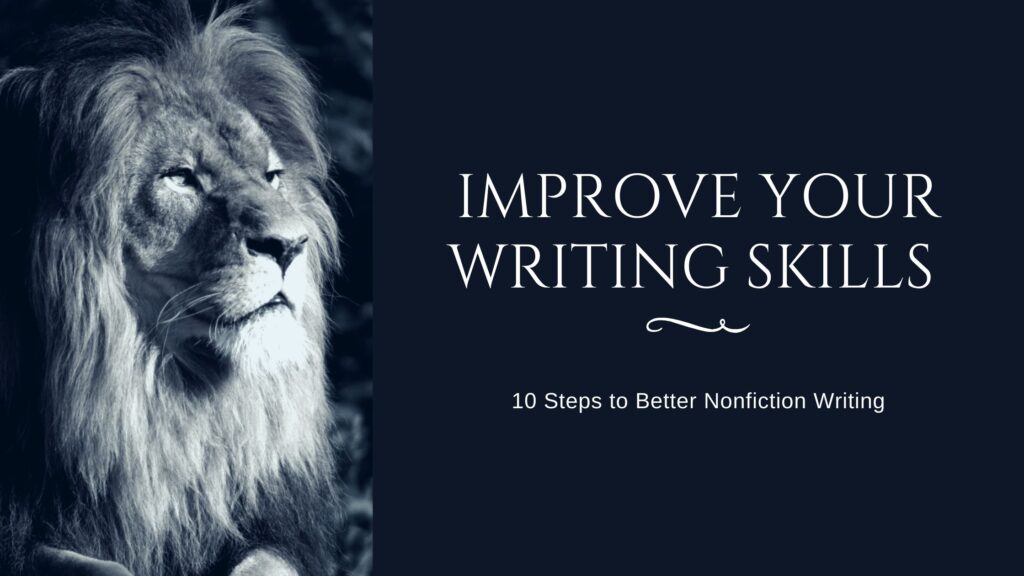Writers often ask how they can become more efficient writers, better writers. They want to write more and they want to write better.
They are looking for the secrets of the trade. They think the secret is in the words on the page. The secret to becoming a better writer often stems from how we think about writing. Putting your pen to paper, or fingers to the keyboard, is not the first thing a professional writer does.
Here are 10 things you can do to become a better writer.
Know Your Audience
I often sit with a client who is stuck and ask them about their ideal reader. Two minutes in, they say, well now I know what to write. What to say becomes much simpler if you know who you are writing to. If I said write a generic thank-you letter to an anonymous teacher, you’d be stumped. If I asked you, who was your favorite teacher and why? You could answer that question. Then if I said write her a thank-you letter, you would write a much better thank you. (Ms. Horne – thank you for telling me I didn’t have to write, “I don’t know the answer” on the test when I didn’t know an answer.)
Think Before You Write
Most people think writing is about putting words on paper. Most writing happens before the pen is in your hand. Many writers jump in and then don’t write quality prose immediately. Then they think that reflects their writing skill. It isn’t. It reflects their planning skills. I am yet to meet someone who can’t write well when they are given the skills included in the writing process. High school set out some unrealistic expectations of writing. Time to let go of them.

Brain Dumps and Brainstorming
Stop holding all that information in your head. No wonder you can’t figure out what to say, you have too much going on in your head. Dump it out somewhere! Put in on paper, a poster, in a document on your computer, on the back of a napkin. It doesn’t matter, get it out so you have space to think in your head.
Create an Outline
Once you stop holding all that information in your head, write an outline. Point form. Give yourself a guide. An outline is a lifesaver on those days when you don’t know what to write. On those days when ideas don’t flow, pick one idea from your outline, something small and riff on it for five minutes. Time it. Write, “I don’t know what to say about running a marathon. Um, I guess it’s hard.” Until something flows. Or say it out loud and record it to transcribe later.
Prioritize Your Key Points
While you are outlining your ideas, prioritize your key points. That way, they won’t get lost in the word vomit that inevitably comes when you are writing a first draft. Words gushing out are good. Don’t worry if they are all diamonds. Some will be coal. Revision is about turning coal into diamonds.
Break Your Writing into Chunks
Don’t write a book. Write a sentence. Write a paragraph. That’s all you need to focus on. I hike up mountains, but I can’t think about the 800 meters in front of me. I must think about just the next step, and then the next step. When I don’t think about the whole hike, I can do so much more. I don’t get overwhelmed. Writing is the same. Don’t write a book. Write one paragraph.
Use Bullet Points
When you can’t get sentences out, jot down bullet points. That’s okay. No one says you have to write perfectly formed sentences every time. Your bullet points often become your key points and often, once they are out, you can flesh them out. If you start a writing session with bullet points, you are on your way.
Pen a Letter to Your Reader
Why is writing a book different from penning a letter to your reader? If you get stuck, imagine them sitting across from you in a café. They have asked you a question. Answer them as though they are right in front of you, and you are explaining this beautiful idea you have that can change their lives.
Think back to your thank you letter to your teacher. Write like that.
Keep Your Writing Simple
One of the biggest things that often stops writers in their tracks is their need to write ‘impressive’ words and sentences. You don’t need to do that. You have nothing to prove to us. We are not your evil high school English teacher. We want your wisdom, not your IQ.
Use a Grammar Checker
Don’t just edit what you are writing. Grammar checkers, like ProWritingAid, can show you patterns in your writing. You can learn to be a better writer from them. The same if you work with an editor. I am happy to help my editing clients understand how they can revise and improve their own writing.
Writing doesn’t have to be an excruciating experience. Becoming a better writing takes practice. And these 10 steps can help you improve your writing skills.
If you are working on a book, download the Author Nation Planning Checklist to help you make your author journey easier and more successful.
What are your best tips to become a better writer?
– Keep writing
Melody Ann
Author Nation is your go-to resource for becoming a successful nonfiction author, from planning to promotion and everything in between. Download the resource for the stage you are in.
